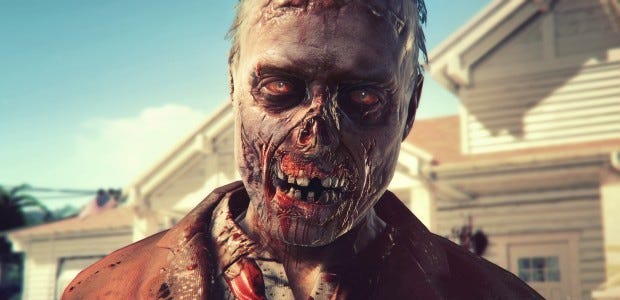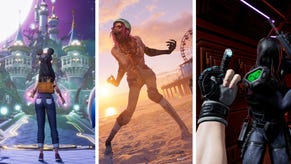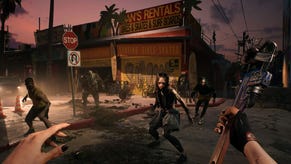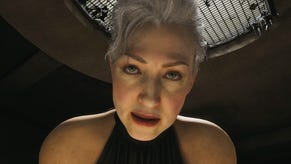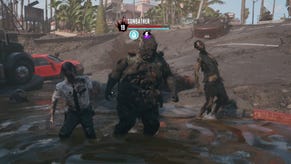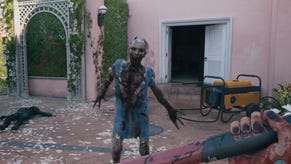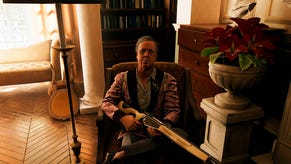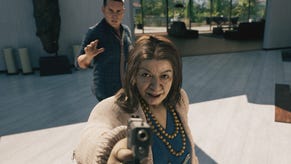Hands On: Dead Island 2
Reanimated
The original Dead Island was buggy, often sexist, sometimes racist, and frequently a chore to play. Then its expandalone Riptide added "offensively marketed" to that list.
Dead Island 2 has a new developer - Spec Ops: The Line's Yager - and therefore a chance at a fresh start. A chance to take all that ambition and promise and focus on what players actually liked about the original: co-op japes, a sunny open-world, and the ability to weld a battery onto a knife and use it to stabbily electrocute hundreds of undead. I played Dead Island 2 for 24 minutes at Gamescom and the whole approach seems prompted by saying, 'Hey, let's do the obvious things, and not do the awful things?'
This process begins with an effort to smooth out rougher edges in the style of the original game. "Sometimes the tone and what players were actually doing was very uneven," says Jörg Friedrich, design director at Yager. "It sometimes had really dark and depressing moments, but if you looked at what people were actually doing and posting on Twitch and YouTube and everywhere, it was over-the-top. 'Let's gather these zombies over here and slaughter them all,' and they had a lot of fun while they were supposed to feel bad. We felt like that's something we should look into and fix this 'ludonarrative dissonance,' as Clint Hocking described it."
Tone is a pretty good euphemism for the severe problems I mentioned in my first paragraph, but it holds true when I play the game. For starters, the four main characters this time around aren't victims of a zombie apocalypse, but willing participants. They've each decided to move or stay within California - no, it's not set on an island this time - because they like the independence, the isolation, and the opportunity to drive sledgehammers into rotting flesh. It's a licence to enjoy yourself.
My session with the game begins in a small suburban zone near Los Angeles' Hollywood sign. The area has been carved off specifically for the demo and represents a tiny portion ("5 to 10 percent") of just one of the final game's intended playable areas, which includes LA, San Francisco, and an unannounced third.
The session is for eight-player co-op, but that doesn't mean the eight of us playing are bound to one another. We're let loose to go exploring in and around the nearby homes, hardware stores, garages and so on, to see what weapons we can find and how many zombies we can smash. The idea is that co-op should be ambient; you join up with some friends or strangers and it's then an omnipresent background activity you can opt into or not.
I decide to not and spend my time trundling around houses, looking for weaponry. I collect enough materials that my class's starting machete automatically becomes electrified, meaning every enemy I strike is temporarily stunned. So far, so similar, but the difference from the original game is that each strike now feels impactful instead of sluggish. Over the course of my time with the game, first as the Speeder class and second as the Berserker, I slash and fry, hammer and crack, blast with shotguns, explode with petrol cans, and perform other horribly deforming attacks. My weapon doesn't break once, though Yager says that if it had, I could have repaired it using materials on site instead of having to find a workbench first.
Towards the end of both my play session, an event triggered - unseen NPCs deciding to blast music for a party - which drew zombies together in the same place. This is meant as a lure for co-op players to group together to rack up points and earn extra XP rewards by killing as many undead as they can. As per the original game, the combat scales well, becoming more frenetic and exciting the more undead are thrown at you. Although we didn't see any, there will also be PvE events during co-op; the example I'm told is of a helicopter carrying treasure - you know, a treasure copter - which will crash somewhere near groups and create a bubble where they can kill one another to claim the goods inside. It sounds like Rust.
If you decide to still ignore these events and wander off into the open-world, the game can continue to re-match you with co-op partners in whatever area you're
This isn't Yager's first time making a sequel to someone else's series. The studio's last game, Spec Ops: The Line, revived a forgotten series of military shooters by exploring the political themes of war crimes/manipulative and unavoidable button presses. The goal that time around was different for two reasons. For one, Friedrich was setting out with the specific goal of making players feel bad. For two, "the last games before [Spec Ops] The Line weren't really good," says Friedrich.
Still, zombie films are traditionally used for social commentary and an isolated California full of gung-ho independents seems a ripe setting. Friedrich agrees - "I think people will figure Yager's handwriting in the game" - but seems more excited about other things. "It was actually a relief to finally do something light-hearted and move away from this super-serious topic that we had to work on for five years."
This is, I think, why I find myself excited about the game as well. I went into Dead Island 2 wondering how they were going to thread a difficult needle and move on from the series' scuzzy past. I came away realising that they were trying to make a simple game about hitting zombies with your friends - whether it ends up being any good or not, why should needles have anything to do with it?
